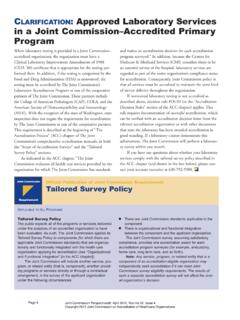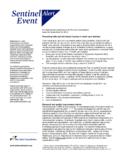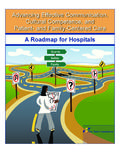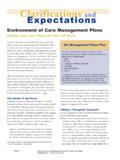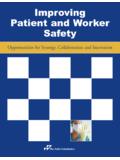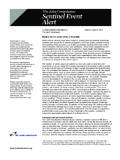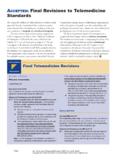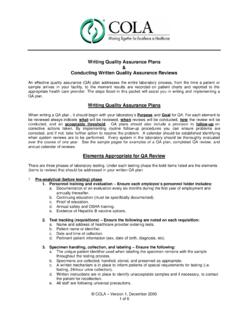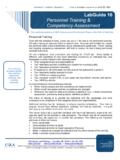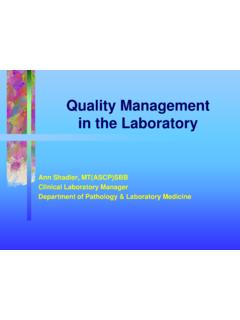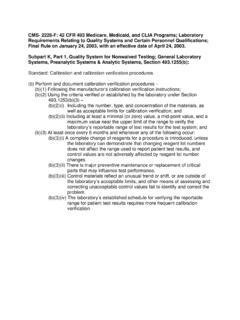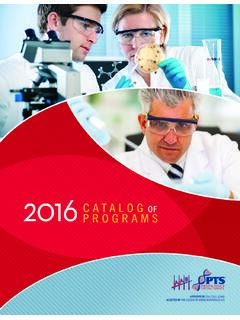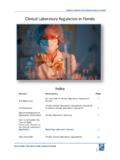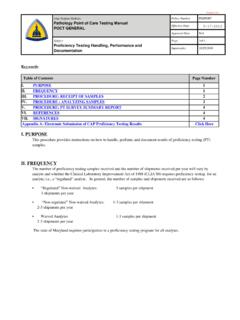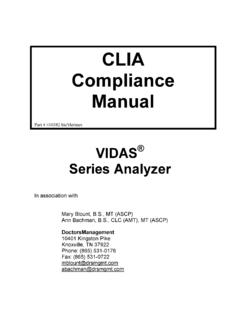Transcription of 2013 Laboratory Accreditation Overview Guide
1 2013 Laboratory AccreditationOverview GuideExcellence in Laboratory Accreditation Dear Laboratory Colleague, The Laboratory Accreditation Overview is your comprehensive resource for exploring the benefits of Joint Commission Laboratory Accreditation and key information regarding our process including: The initial application process Types of surveys and laboratories accredited Survey agenda Intracycle Monitoring (ICM) Tracer Methodology Lab Central Connect This Overview is focused primarily towards initial or first-time applicants to the Joint Commission Accreditation process but is also relevant to laboratories seeking continued Accreditation with us. I look forward to answering your questions or discussing in detail how Joint Commission Accreditation can help your lab achieve its quality and safety goals. Please don t hesitate to contact me directly at the phone or email information below.
2 Thank you again for your interest in the Joint Commission s Laboratory Accreditation Program. Sincere regards, Jennifer Rhamy, MBA, MA, MT(ASCP) SBB, HP Executive Director Laboratory Accreditation Program , in Laboratory Accreditation 1 Directory of Laboratory Accreditation Resources Seeking Joint Commission Accreditation For information on Accreditation , questions or comments on the Laboratory Accreditation Program: Jennifer Rhamy, MBA, MA, MT (ASCP), SBB, HP, Executive Director (630)792-5754 For questions on applying for Joint Commission Accreditation for the first time or to request an Application for Accreditation : Sharon Hibbe, Project Manager-Business Intelligence (630)792-5817 Proficiency Testing For questions about unsuccessful proficiency testing and corrective plans of action: Eileen Stawczyk, MT (ASCP), Project Manager (630)792-5248 Standards Interpretation Group For information regarding interpreting and applying specific standards.
3 (630)792-5900 Option 6 For information about interpreting and applying specific Laboratory standards, request assistance from a Laboratory specialist: An online standards questionnaire form is also available at: For Frequently Asked Questions about Standards go to: For information and Frequently Asked Questions about the National Patient Safety Goals (NPSGs) go to: For Frequently Asked Questions about Laboratory Accreditation : Excellence in Laboratory Accreditation 2 Pricing For questions on survey fees and application deposits: Planning and Financial Affairs (630)792-5115 Current Customers Accredited organization may contact their assigned Account Executive at his/her extension or (630)792-3007 Joint Commission Web Site: Standards Information and FAQs Proficiency Testing News and Articles Educational Resources Joint Commission Resources Web Site: or (877) 223-6866 To purchase a standards manual To register for, or receive information about education programs, and to purchase, or inquire about publications Catalog of publications Perspectives: The Official Joint Commission News Source Excellence in Laboratory Accreditation 3 Table of Contents Directory of Laboratory Accreditation Resources.
4 1 Why Choose Joint Commission Accreditation ? .. 4 Initial Application Process .. 6 Eligibility for Accreditation .. 6 How do I apply for an initial Laboratory survey .. 8 Accreditation Requirements .. 9 Lab Accreditation Fees .. 13 Lab Advantage Option .. 13 Pathologist Specialist Option .. 13 Multiorganization Option .. 13 Concurrent Survey Option .. 14 Simultaneous Survey Option .. 14 Standards and Accreditation .. 15 Scoring and Criticality .. 16 Accreditation Policies .. 18 Proficiency Testing Enrollment .. 19 Lab Central Connect .. 20 Proficiency Testing Monitoring .. 21 Survey Process .. 23 Lab Surveyors .. 24 Different Types of Lab Surveys .. 25 Components of the On-Site Survey .. 26 Sample Survey Agenda .. 26 Survey Scheduling .. 35 After the Survey .. 36 Accreditation Decisions .. 37 Intracycle Monitoring (ICM) .. 38 Forms .. 40 Excellence in Laboratory Accreditation 4 Why Choose Joint Commission Laboratory Accreditation ?
5 We accredit more organizations than anyone else in health care The Joint Commission accredits over 20,000 health care organizations, including approximately 1700 clinical laboratories holding close to 2,500 certificates. The Joint Commission is the leader in Accreditation , with nearly 60 years of experience across the full spectrum of health care organizations. Joint Commission Accreditation , which is awarded to a Laboratory every two years, represents the Gold Seal of ApprovalTM in health care and provides the most comprehensive evaluation process in the industry. The Joint Commission Laboratory Accreditation certificate demonstrates to patients and their families that the Laboratory has a commitment to providing safe, quality care and services for patients integrated with the entire organization. As the demand for greater accountability for quality and cost grows, it is more important than ever to have the quality distinction that is part of the facility s overall quality management systems.
6 Achieving Accreditation makes a strong statement to the community about a Laboratory s efforts to provide patient safety and services of the highest quality. CLIA certification The Joint Commission began evaluating Laboratory services separately in 1979 and has deeming authority under the Clinical Laboratory Improvement Amendments (CLIA) for CMS. Many states recognize the Joint Commission s Accreditation process in lieu of their own, saving you a redundant inspection. All labs in organization surveyed concurrently A key advantage of the Laboratory survey process is that all laboratories within an organization can be reviewed during the course of one survey. For example, freestanding ambulatory care centers, surgery centers, behavioral health and long term care facilities, as well as hospitals, are often part of the same health care organization. Many have their own Laboratory services, each with a CLIA certificate number.
7 The Joint Commission survey covers not only laboratories in the hospital, but also laboratories serving different organizational elements even if services are provided off-campus or in a neighboring state. A separate survey request for each Laboratory is not required which can save you both time and money. In addition, you are guaranteed of a consistent team looking at all of your processes. Other key advantages of the Joint Commission s Accreditation process Focuses on analysis processes and patient outcomes rather than just compliance with technical requirements. Excellence in Laboratory Accreditation 5 Tracers assess the effectiveness of patient care processes in meeting high standards of quality and safety by following Laboratory results all the way to the patient s chart. NO reciprocal surveys to perform. NO inspection training to attend. NO large numbers of Laboratory staff showing up to inspect, and potentially disrupt services in your lab.
8 Dedicated account executive ensures you reach the correct resource at The Joint Commission. Professional, employed surveyors. Each surveyor surveys from 45 70 labs per year, so therefore they are better able to share leading practices seen in other labs. This adds consistency to the survey process and prevents possible institutional bias. Each Laboratory is provided a secure log in on The Joint Commission Connect extranet site to receive and submit all Joint Commission information. Smaller surveyor teams for more days can be less disruptive to larger labs and provides opportunities to show full process outcomes rather than one day s output. A non-punitive Intracycle Monitoring (ICM), which is a self-assessment for identifying opportunities for improvement and supporting continuous standards compliance. Includes the option for a phone conference with Joint Commission staff, who can assist you with and approve your Plans of Action.
9 Year-round access to Laboratory professionals in the Standards Interpretation Group via phone and online support for your standards related questions. Complimentary membership in the Lab Advantage Program which is a collaboration between The Joint Commission, American Society for Clinical Pathology and the American Proficiency Institute. The Lab Advantage Program achieves significant cost reductions in proficiency testing, staff education, and Accreditation fees. Reduces redundancy resulting from managing multiple Accreditation organizations. The Joint Commission is also recognized by many states as satisfying the need for a state CLIA survey. Assists senior leadership in better recognizing how the hospital or facility and Laboratory must align to assure overall quality and safety of patient care due to the high organizational visibility of the survey. Excellence in Laboratory Accreditation 6 INITIAL APPLICATION PROCESS What types of laboratories can become Joint Commission accredited and what are the eligibility requirements?
10 The Joint Commission surveys many different types of clinical laboratories: Hospital laboratories Reference laboratories Physician office laboratories Assisted reproductive technology laboratories Clinics Long term care facilities Home care organizations Behavioral health organizations Public health laboratories, including Indian health services Ambulatory sites Blood transfusion Federally owned laboratories. For purposes of CLIA certification, Laboratory testing is defined as analyzing a substance removed from the body and using this information for the diagnosis, prevention, or treatment of any disease, impairment, or assessment of the health of human beings. CLIA regulations require that Laboratory surveys be conducted every two years. This means that, if your Laboratory is part of another Joint Commission accredited health care organization, your survey may not ordinarily take place at the same time as your health care organization s triennial survey.
